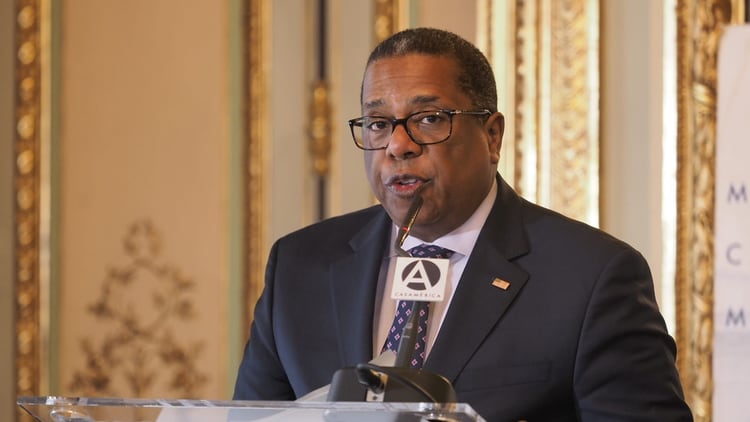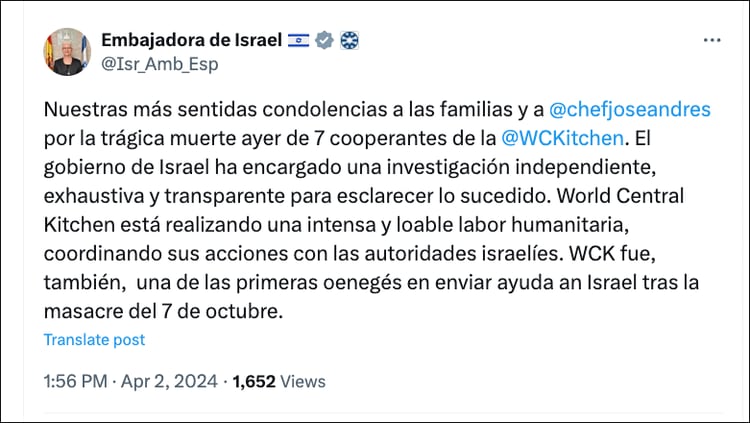Luis Ayllón
The US Assistant Secretary of State for Western Hemisphere Affairs, Brian A. Nichols, yesterday in Madrid, urged the regime of Nicolás Maduro to “change course” and allow free elections to be held in Venezuela.
Nichols, who is the head of the Biden Administration for Latin American affairs, gave a conference at Casa América, where he was introduced by the new director of the institution, León de la Torre.
Previously, in the morning, he held a meeting with the State Secretary for Ibero-America, the Caribbean and Spanish in the World, Susana Sumelzo, with whom he analysed the priorities of the United States for the region, and headed the US delegation at the bilateral meeting on Central America.
According to diplomatic sources consulted by The Diplomat, the meeting with the Spanish authorities highlighted the desire of the two countries to strengthen cooperation in Latin America, as well as between the United States and the European Union.
Nichols himself made this desire clear during a conference that focused on the situation in three countries where there are serious democratic shortcomings: Nicaragua, Venezuela and Cuba.
The US Assistant Secretary of State made no secret of his country’s disappointment at the behaviour of Maduro, whose representatives he accused of not having fulfilled the commitments made in the Barbados Agreement signed in October by Chavistas and opponents. He alluded to the manoeuvres of the Bolivarian regime to disqualify the opposition candidate for the presidential elections, María Corina Machado, and the adoption of numerous obstacles to prevent the presence of another alternative candidate, Corina Yoris.
Nichols demanded the holding of “inclusive” and “competitive” elections in Venezuela, and, although he acknowledged that the actions of the Bolivarian regime do not give rise to “much hope” that this can be the case, he affirmed that “there is still time” for Nicolás Maduro to “change course”.
The senior US official indicated that Washington took “a calculated risk” by alleviating part of the sanctions against Venezuela by alleviating part of the economic sanctions against Venezuela. He recalled that General Licence 44, which allowed certain activities, expires on 18 April, and said that they will not say before then whether all sanctions will be resumed.
Asked about the differences with the position of Spain, which has advocated in the European Union for an easing of these sanctions, he replied that these are “independent” decisions and that, in any case, “very close contact” is maintained with the aim of acting in a “coordinated” manner on both sides of the Atlantic.
Nichols did not wish to delve into these possible differences, preferring to praise “Spain’s firm commitment to supporting democracy at a global level” and highlighting the importance given to EU relations with the region during the Spanish Presidency of the Council of the EU during the last six months.
The Assistant Secretary of State for the Western Hemisphere also criticised the increase in repression in Venezuela against opponents and activists, called for the “immediate release” of those detained and thanked Spain for its calls for the release of the Spanish-Venezuelan Rocío San Miguel.
He also described as “very important” the public criticism by the President of Colombia, Gustavo Petro, of the repression of the opposition in Venezuela, since he is a leader with “a lot of weight” in the region, he said.
Cuba and Nicaragua
With respect to Cuba, Nichols underlined the upsurge of protests in recent weeks to demand social improvements and the “courage” of Cuban citizens in demanding fundamental freedoms. The solution to all these problems is democracy,” he said.
He recalled the words of US President Joe Biden, saying that he will maintain “a tough policy with the regime, but soft on the people”. And after pointing out that his country will continue to press for the release of more than a thousand political prisoners on the island, he considered it positive that, on the economic front, “the private sector is providing more and more basic goods and services that the government cannot provide”.
With regard to Nicaragua, Nichols deplored the “repressive and anti-democratic behaviour” of the Nicaraguan authorities, who seek to “silence” civil society and “unjustly” imprison hundreds of people. He thanked Spain for quickly granting Spanish nationality to the Nicaraguans banished by Daniel Ortega from their country, which he described as a “show of humanity and solidarity”.
Guatemala, Ecuador, Haiti
Nichols also praised Spain’s “key” role in mobilising the EU in the recent adoption of a firm position “in favour of democracy” in Guatemala, following the struggle between the Attorney General’s Office and President Bernardo Arévalo after last year’s elections. “Arévalo’s presidency demonstrates how citizens can make their voices heard,” he said.
The US official for Latin America insisted that Washington aspires to the region as a “bastion of democracy”, insofar as only advances in this sense can guarantee “more security and prosperity”. Referring to the case of Ecuador, he pointed out that the reforms promoted by President Daniel Noboa “demonstrate that democracy produces results”.
He also indicated that the US Administration sees it as a “top priority” to recover stability in Haiti, which involves “restoring institutionality” and supporting the international mission that is still pending, in which he highlighted the economic aid offered by Spain.
Nichols also applauded the fact that Spain shares with the United States the priorities for economic development, the defence of the environment, the fight against corruption and the adoption of fair migration policies. In this respect, he recalled that Spain has offered to take in part of the migrants who register at dozens of centres that the United States plans to open in Central America to encourage legal immigration channels. Migrants,” he said, “should take advantage of these legal channels instead of embarking on a dangerous journey”.







